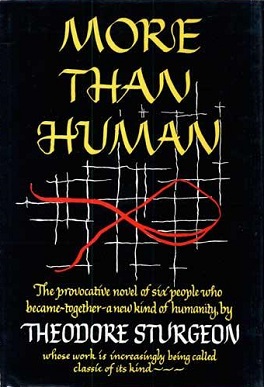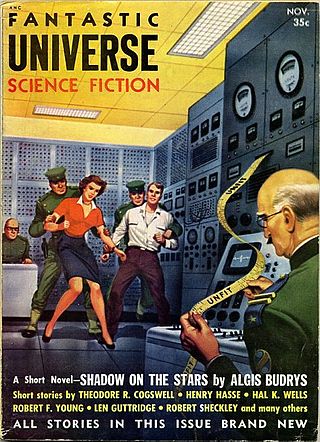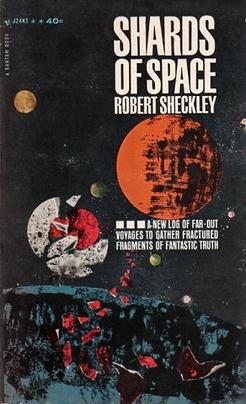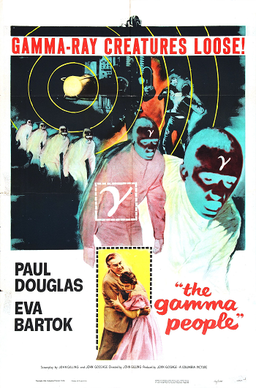Edward Groff Conklin was an American science fiction anthologist. He edited 40 anthologies of science fiction, one of mystery stories, wrote books on home improvement and was a freelance writer on scientific subjects as well as a published poet. From 1950 to 1955, he was the book critic for Galaxy Science Fiction.

Sam Moskowitz was an American writer, critic, and historian of science fiction.

The Magazine of Fantasy & Science Fiction is a U.S. fantasy and science fiction magazine, first published in 1949 by Mystery House, a subsidiary of Lawrence Spivak's Mercury Press. Editors Anthony Boucher and J. Francis McComas had approached Spivak in the mid-1940s about creating a fantasy companion to Spivak's existing mystery title, Ellery Queen's Mystery Magazine. The first issue was titled The Magazine of Fantasy, but the decision was quickly made to include science fiction as well as fantasy, and the title was changed correspondingly with the second issue. F&SF was quite different in presentation from the existing science fiction magazines of the day, most of which were in pulp format: it had no interior illustrations, no letter column, and text in a single-column format, which in the opinion of science fiction historian Mike Ashley "set F&SF apart, giving it the air and authority of a superior magazine".
Joseph Wolfe Ferman was a Russian Empire–born American science fiction publisher.

Expedition to Earth (ISBN 0-7221-2423-6) is a collection of science fiction short stories by English writer Arthur C. Clarke.

More Than Human is a 1953 science fiction novel by American writer Theodore Sturgeon. It is a revision and expansion of his 1952 novella Baby Is Three, which is bracketed by two additional parts written for the novel . It won the 1954 International Fantasy Award, which was also given to works in science fiction. It was additionally nominated in 2004 for a "Retro Hugo" award for the year 1954. Science fiction critic and editor David Pringle included it in his book Science Fiction: The 100 Best Novels.

The Body Snatchers is a science fiction novel by American writer Jack Finney, originally serialized in Collier's magazine in November–December 1954 and published in book form the following year.

The Tritonian Ring and Other Pusadian Tales is a 1953 collection of stories by American science fiction and fantasy author L. Sprague de Camp, first published in hardcover by Twayne Publishers. An E-book edition was published as The Tritonian Ring and Other Pasudian [sic] Tales by Gollancz's SF Gateway imprint on September 29, 2011 as part of a general release of de Camp's works in electronic form. The pieces were originally published between 1951 and 1953 in the magazines and anthologies Two Complete Science Adventure Books, Fantasy Fiction, Imagination Stories of Science and Fantasy, and Fantastic Adventures. The title story, the novel The Tritonian Ring has also been published separately.
There have been many attempts at defining science fiction. This is a list of definitions that have been offered by authors, editors, critics and fans over the years since science fiction became a genre. Definitions of related terms such as "science fantasy", "speculative fiction", and "fabulation" are included where they are intended as definitions of aspects of science fiction or because they illuminate related definitions—see e.g. Robert Scholes's definitions of "fabulation" and "structural fabulation" below. Some definitions of sub-types of science fiction are included, too; for example see David Ketterer's definition of "philosophically-oriented science fiction". In addition, some definitions are included that define, for example, a science fiction story, rather than science fiction itself, since these also illuminate an underlying definition of science fiction.

Fantastic Universe was a U.S. science fiction magazine which began publishing in the 1950s. It ran for 69 issues, from June 1953 to March 1960, under two different publishers. It was part of the explosion of science fiction magazine publishing in the 1950s in the United States, and was moderately successful, outlasting almost all of its competitors. The main editors were Leo Margulies (1954–1956) and Hans Stefan Santesson (1956–1960).

The Tritonian Ring is a heroic fantasy novel written by L. Sprague de Camp as part of his Pusadian series. It was first published in the magazine Two Complete Science Adventure Books for Winter, 1951, and first appeared in book form in de Camp's collection The Tritonian Ring and Other Pusadian Tales. Its first publication as a stand-alone novel was as a paperback by Paperback Library in 1968; the first hardcover edition was from Owlswick Press in 1977. An E-book edition was published as The Tritonian Ring and Other Pasudian [sic] Tales by Gollancz's SF Gateway imprint on September 29, 2011 as part of a general release of de Camp's works in electronic form.

Shards of Space is a collection of science fiction short stories by American writer Robert Sheckley. It was first published in 1962 by Bantam Books.

The Gamma People is a 1956 British-American black-and-white science fiction film, produced by John Gossage, directed by John Gilling, that stars Paul Douglas, Eva Bartok, and Leslie Phillips. The film, shot in Imst, Austria, was distributed by Columbia Pictures and evolved from a script treatment originally written in the early 1950s by Robert Aldrich. The Gamma People was released theatrically in the U.S. as a double feature with the 1956 British science fiction film 1984.
William Milligan Sloane III was an American writer of fantasy and science fiction literature, and a publisher. Sloane is known best for his novel To Walk the Night.
The anthropologist Leon E. Stover says of science fiction's relationship to anthropology: "Anthropological science fiction enjoys the philosophical luxury of providing answers to the question "What is man?" while anthropology the science is still learning how to frame it". The editors of a collection of anthropological SF stories observed:
Anthropology is the science of man. It tells the story from ape-man to spaceman, attempting to describe in detail all the epochs of this continuing history. Writers of fiction, and in particular science fiction, peer over the anthropologists' shoulders as the discoveries are made, then utilize the material in fictional works. Where the scientist must speculate reservedly from known fact and make a small leap into the unknown, the writer is free to soar high on the wings of fancy.

Looking Forward is an anthology of science fiction stories edited by Milton Lesser, published in hardcover in 1953 by Beechhurst Press and reprinted in the British market in 1955 by Cassell & Company. The anthology was particularly poorly received, and carried the unusually high cover price, for its day, of $5.00. Its contents include one of the few uncollected and otherwise unanthologized stories by Walter M. Miller, Jr.

Born of Man and Woman is the first collection of science fiction and fantasy stories by Richard Matheson, published in hardcover by Chamberlain Press in 1954. It includes an introduction by Robert Bloch. A truncated edition, dropping four stories, was published by Bantam Books in 1955 as Third from the Sun.

Science Fiction Inventions is a reprint anthology of science fiction stories, edited by Damon Knight and published by Lancer Books as an original paperback in 1967.

Two Complete Science-Adventure Books was an American pulp science fiction magazine, published by Fiction House, which lasted for eleven issues between 1950 and 1954 as a companion to Planet Stories. Each issue carried two novels or long novellas. It was initially intended to carry only reprints, but soon began to publish original stories. Contributors included Isaac Asimov, Robert A. Heinlein, Arthur C. Clarke, Poul Anderson, John Brunner, and James Blish. The magazine folded in 1954, almost at the end of the pulp era.

The Explorers is a collection of science fiction stories by American writer C. M. Kornbluth, originally published in paperback by Ballantine Books in 1954. Ballantine reissued the collection, which was Kornbluth's first, in 1963. While no further editions of the collection were published, six of its nine stories were included in Ballantine's 1977 The Best of C. M. Kornbluth, and all the stories are contained in NESFA's 1997 His Share of Glory: The Complete Short Science Fiction of C. M. Kornbluth.















